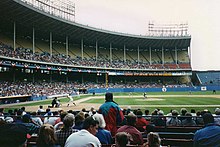
Lynn Nolan Ryan Jr., nicknamed "the Ryan Express", is an American former professional baseball pitcher and sports executive. Over a record 27-year playing career in Major League Baseball (MLB), Ryan pitched for the New York Mets, California Angels, Houston Astros, and Texas Rangers. After his retirement in 1993, Ryan served as chief executive officer (CEO) of the Texas Rangers and an executive advisor to the Houston Astros. He was inducted into the Baseball Hall of Fame in 1999, and is widely considered to be one of the greatest MLB pitchers of all time.
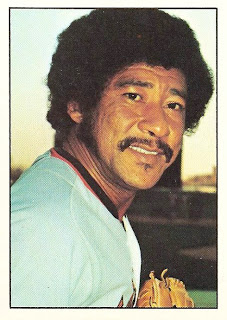
Miguel Ángel Cuellar Santana was a Cuban professional baseball player. He played for 15 seasons in Major League Baseball as a left-handed pitcher in 1959 and from 1964 through 1977, most prominently as a member of the Baltimore Orioles who won the American League (AL) pennant in each of Cuellar's first three seasons with the team. During that time, Cuellar and the Orioles won the 1970 World Series. Cuellar also played for the Cincinnati Reds, St. Louis Cardinals, Houston Astros and California Angels.

José Dennis Martínez Ortiz, nicknamed "El Presidente", is a Nicaraguan former professional baseball pitcher. Martínez played in Major League Baseball (MLB) for the Baltimore Orioles, Montreal Expos, Cleveland Indians, Seattle Mariners, and Atlanta Braves from 1976 to 1998. He threw a perfect game in 1991, and was a four-time MLB All-Star. He was the first Nicaraguan to play in the majors.
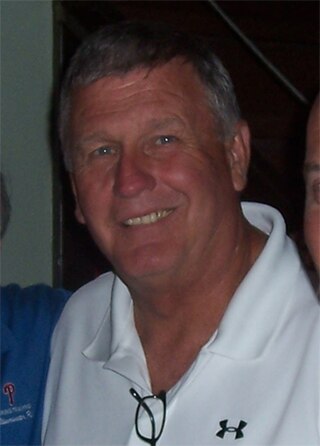
Thomas Edward John Jr., nicknamed "the Bionic Man," is an American former professional baseball pitcher who played in Major League Baseball (MLB) for 26 seasons between 1963 and 1989. He played for the Cleveland Indians, Chicago White Sox, Los Angeles Dodgers, New York Yankees, California Angels, and Oakland Athletics. He was a four-time MLB All-Star and has the second-most wins (288) of any pitcher since 1900 not in the Hall of Fame. Known for his longevity, John was the Opening Day starter six times – three for the White Sox and three times for the Yankees.
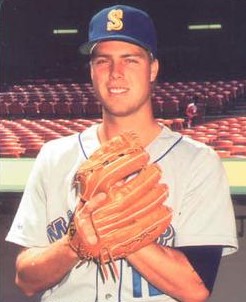
Mark Edward Langston is an American former Major League Baseball left-handed pitcher. He pitched for the Seattle Mariners (1984–1989), Montreal Expos (1989), California / Anaheim Angels (1990–1997), San Diego Padres (1998), and Cleveland Indians (1999). During a 16-year baseball career, Langston compiled 179 wins, 2,464 strikeouts, and a 3.97 earned run average (ERA).

Frank Daryl Tanana is an American former professional baseball left-handed pitcher. In a Major League Baseball career that stretched from 1973 to 1993, he pitched for the California Angels, Boston Red Sox, Texas Rangers, Detroit Tigers, New York Mets, and New York Yankees. He struck out 2,773 batters in his career and twice won playoff-clinching games for the teams he was on, the 1979 Angels and the 1987 Tigers.

David Arthur McNally was an American professional baseball player. He played in Major League Baseball as a left-handed pitcher from 1962 through 1975, most notably as a member of the Baltimore Orioles dynasty that won four American League pennants and two World Series championships between 1966 and 1971. A three-time All-Star, McNally won 20 or more games for four consecutive seasons from 1968 through 1971. He was one of four 20-game winners for the 1971 Orioles, currently the last team as of 2023 to have four 20-win pitchers on the same roster.

Wilbur Forrester Wood Jr. is an American former professional baseball pitcher. In a 17-year Major League Baseball (MLB) career, he pitched for the Boston Red Sox (1961–64), the Pittsburgh Pirates (1964–65), and the Chicago White Sox (1967–78). A knuckleball specialist after joining the White Sox, he threw left-handed and batted right-handed.
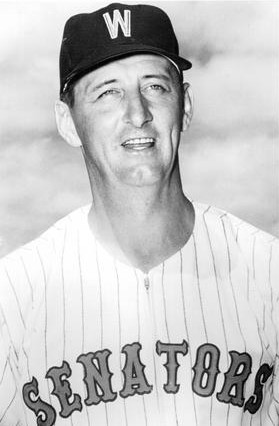
Richard Edward Donovan was an American Major League Baseball pitcher who played for the Boston Braves (1950–1952), Detroit Tigers (1954), Chicago White Sox (1955–1960), Washington Senators (1961) and Cleveland Indians (1962–1965). He batted left-handed and threw right-handed, stood 6 feet 3 inches (1.91 m) tall and weighed 190 pounds (86 kg).
Arthur Lee Guetterman, nicknamed "Goot," is an American former professional baseball pitcher who played from 1984 to 1996 for the Seattle Mariners, New York Yankees, New York Mets, and St. Louis Cardinals of Major League Baseball (MLB). A southpaw used primarily in the major leagues as a relief pitcher, he stood 6 feet 8 inches (2.03 m) tall. He led the Yankees in wins in 1990 without starting a game.
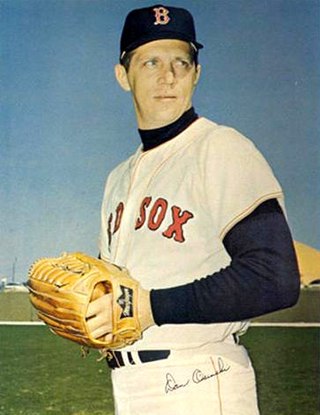
Daniel Osinski, nicknamed "The Silencer", was an American Major League Baseball relief pitcher. The 6 ft 2 in (1.88 m), 195 pounds (88 kg) right-hander was signed by the Cleveland Indians as an amateur free agent before the 1952 season. He played for the Kansas City Athletics (1962), Los Angeles Angels (1962–1964), Milwaukee Braves (1965), Boston Red Sox (1966–1967), Chicago White Sox (1969), and Houston Astros (1970).
Bradley David Havens is an American former Major League Baseball pitcher for the Minnesota Twins (1981–83), Baltimore Orioles (1985–86), Los Angeles Dodgers (1987–88), Cleveland Indians (1988–89) and Detroit Tigers (1989).
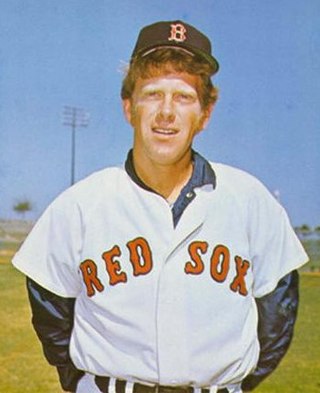
Lewis Bernard Krausse Jr. was an American professional baseball pitcher who played 12 seasons in Major League Baseball (MLB). He played for the Kansas City / Oakland Athletics, Milwaukee Brewers, Boston Red Sox, St. Louis Cardinals, and Atlanta Braves from 1961 to 1974. He batted and threw right-handed and served primarily as a starting pitcher. Once a highly-touted prospect, he had to overcome arm trouble early in his career and spent most of his career with teams that offered low run support.
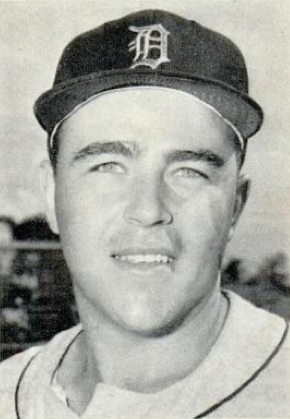
Ned Franklin Garver was an American professional baseball player. He played in Major League Baseball (MLB) as a right-handed pitcher for the St. Louis Browns (1948–1952), the Detroit Tigers (1952–1956), the Kansas City Athletics (1957–1960), and the Los Angeles Angels (1961). Garver and Irv Young are the only pitchers in the modern era of baseball to win 20 or more games for a team that lost 100 games.

Eric Steven King is a former pitcher in Major League Baseball (MLB). He may be best known for giving up Ken Griffey Jr.'s first career Major League home run. King played for three teams during a career that included parts of seven seasons. Those teams are the Detroit Tigers, Chicago White Sox (1989–1990) and Cleveland Indians (1991).
Joseph Andrew Martinez is an American former Major League Baseball (MLB) pitcher. He played parts of four seasons for the San Francisco Giants (2009–2010), Pittsburgh Pirates (2010), Arizona Diamondbacks (2012), and Cleveland Indians (2013). Martinez threw right-handed but batted left-handed.

Eric Michael Surkamp is an American former Major League Baseball (MLB) pitcher who played for the San Francisco Giants, Chicago White Sox, Los Angeles Dodgers, and Oakland Athletics from 2011 to 2016. He also pitched for the Hanwha Eagles of the KBO League in 2016. Surkamp batted and threw left-handed with his fastball averaging 89 miles per hour (143 km/h).

Cody Edward Allen is an American former professional baseball relief pitcher. He played in Major League Baseball (MLB) for the Cleveland Indians from 2012 to 2018 and the Los Angeles Angels in 2019.

Shane Robert Bieber is an American professional baseball pitcher for the Cleveland Guardians of Major League Baseball (MLB). He played college baseball for the UC Santa Barbara Gauchos baseball team as a walk-on. He was drafted by the Indians in the fourth round of the 2016 Major League Baseball draft. Bieber made his MLB debut with Cleveland in 2018, was named an All-Star in 2019 and 2021, and received the American League's 2020 Cy Young Award.
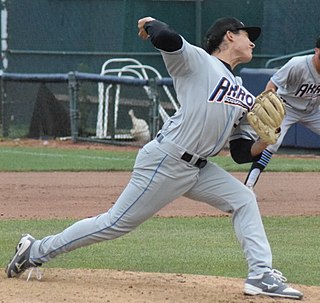
Elijah Allan Morgan is an American professional baseball pitcher for the Cleveland Guardians of Major League Baseball (MLB). He played college baseball for the Gonzaga Bulldogs. Morgan was selected by the Guardians in the eighth round of the 2017 MLB draft, and made his MLB debut in 2021.

